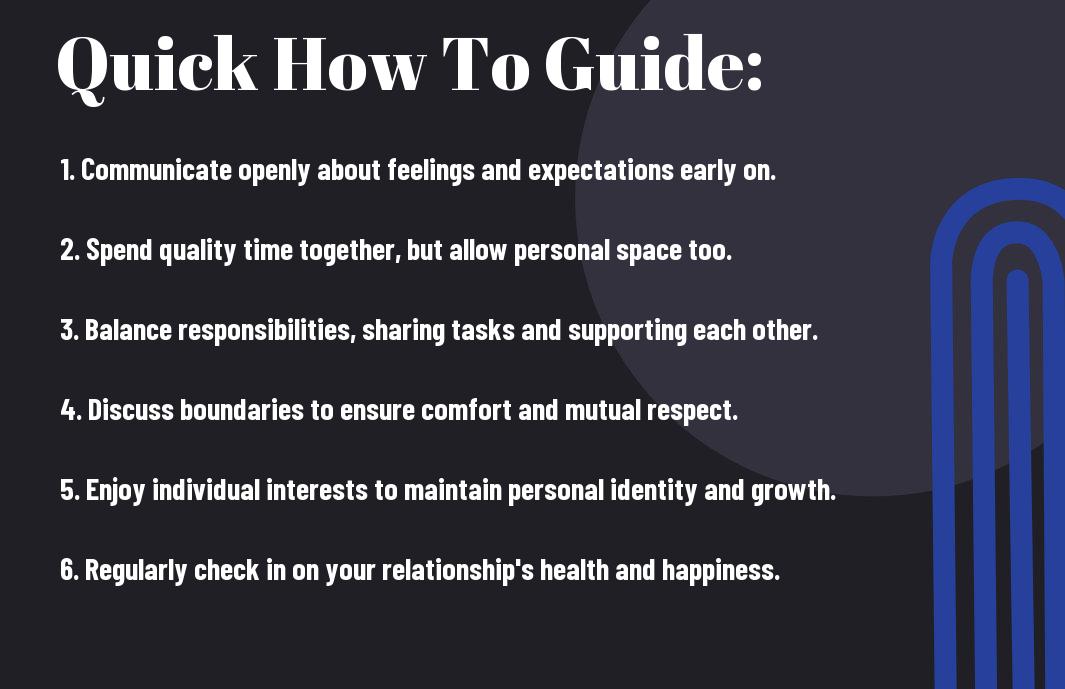Harmony in a new relationship is crucial for building a strong and lasting connection. As you navigate this exciting yet delicate phase, finding equilibrium between your needs and those of your partner is key. By establishing healthy boundaries, maintaining open communication, and nurturing individuality, you can foster a balanced relationship that promotes growth and understanding. In this guide, you’ll discover practical tips to help you create a loving partnership while ensuring both you and your partner feel valued and respected.
Understanding the Dynamics of a New Relationship
Before entering into a new relationship, it’s necessary to grasp how different elements interact to shape your connection. The dynamics between you and your partner can significantly influence your satisfaction and harmony. By recognizing these patterns, you can cultivate a more balanced relationship, fostering mutual respect and understanding to navigate challenges effectively.
Factors Influencing Relationship Balance
If you want to understand what keeps your relationship balanced, consider these factors:
- Communication styles
- Individual expectations
- Common interests
- Trust levels
- Emotional availability
Thou must evaluate how these elements interact in your relationship for better harmony.
Recognizing Emotional Needs
Needs in a new relationship often revolve around emotional support, understanding, and respect. Identifying your emotional needs and communicating them with your partner can create a strong foundation for a healthy relationship. By engaging in open conversations, you allow both of you to express your desires and boundaries, leading to more profound intimacy and mutual satisfaction.
It’s vital to take the time to understand what you personally require emotionally. This includes recognizing your feelings, whether it’s the need for affirmation, connection, or space. By articulating these needs effectively, you create an opportunity for your partner to fulfill them and establish a reciprocal dynamic. Thus, fostering an environment where both individuals feel validated and respected forms the backbone of a balanced relationship.

Communication Strategies for Balance
If you want to foster a healthy relationship dynamic, establishing effective communication strategies is vital. Open dialogue allows both partners to express feelings, thoughts, and concerns, ensuring transparency in your connection. Aim for regular conversations where both partners feel heard, valued, and understood, which helps in creating a balanced relationship.
Tips for Open Dialogue
Communication becomes richer when both partners contribute equally. To create an open dialogue, try the following tips:
- Choose a comfortable environment for discussions.
- Be clear about your feelings without assigning blame.
- Ask open-ended questions to invite more dialogue.
- Stay calm and patient, even during disagreements.
Recognizing the importance of a safe space can significantly enhance your relationship’s communication.
Active Listening Techniques
An effective way to improve your communication skills is through active listening. This technique encourages you to fully engage with what your partner is saying, demonstrating that you value their perspective. By paying attention to their words and non-verbal cues, you’re more likely to respond thoughtfully and empathetically.
Strategies for active listening include maintaining eye contact, nodding to show understanding, and paraphrasing what your partner says to confirm clarity. This not only encourages open communication but also fosters a deeper emotional connection. Allow pauses after your partner speaks, as it shows you’re processing their words and helps avoid misunderstandings. Implementing these techniques will make both you and your partner feel more valued and respected, laying a solid foundation for your relationship.

Setting Boundaries
Keep in mind that setting healthy boundaries is vital for a balanced relationship. It allows you to express your needs without sacrificing your individuality. Engage in open dialogue with your partner about limits and preferences. You can also explore insights like How do you balance being in a relationship with meeting … to help navigate this process effectively.
How to Establish Healthy Limits
While initiating conversations about boundaries may feel daunting, it strengthens your relationship by establishing a foundation of mutual respect and understanding. Take time to identify what areas are important for you, and communicate these to your partner clearly. Listening to their needs will help facilitate a balanced approach to relationship dynamics.
Navigating Personal Space
Space is vital in any relationship, as it allows both partners to maintain their individuality and personal growth. It’s vital to identify how much time you each need alone or with friends to recharge your personal energy. Discussing personal space openly with your partner cultivates trust and understanding, enabling both of you to thrive as individuals while still growing together.
With ongoing communication about personal space, you can create a comfortable environment where both your needs are met. Set clear expectations about time spent together versus alone time, and be willing to adjust as both of your comfort levels evolve. By prioritizing personal space, you ensure that your relationship remains healthy, allowing both partners to feel secure and appreciated.
Sharing Responsibilities
All relationships thrive when both partners contribute equally to shared tasks and responsibilities. Establishing a balance helps to foster trust and collaboration, preventing resentment from building. Open communication about each person’s strengths and preferences is necessary in achieving harmony in your partnership.
Tips for Equitable Contributions
You can ensure fairness in responsibilities by discussing and dividing tasks based on each other’s strengths and availability. Consider these tips:
- Identify individual strengths and weaknesses.
- Communicate openly about your workload.
- Revisit and adjust responsibilities regularly.
Perceiving tasks as a joint effort will deepen your bond and inspire teamwork.
Balancing Time and Commitments
While navigating a new relationship, it’s important to balance your time between personal commitments and shared activities. Scheduling regular date nights, allocating time for personal hobbies, and setting boundaries around work will help maintain this equilibrium. Prioritizing both your needs and your partner’s contributes to a fulfilling connection.
Responsibilities can easily pile up, leaving little time for each other. To prevent this, create a shared calendar for planning important events and commitments. Schedule consistent check-ins to discuss individual and joint priorities. By being mindful of each other’s needs and planning accordingly, you’ll cultivate a more harmonious relationship that respects both individual and shared time.
Fostering Mutual Respect
For any relationship to thrive, establishing a foundation of mutual respect is vital. This means valuing each other’s opinions, needs, and boundaries. By fostering an environment where both partners feel heard and appreciated, you can create a lasting connection that promotes harmony and unity. Mutual respect strengthens your bond and cultivates trust, ensuring you both feel supported in your growth as individuals and as a couple.
How to Encourage a Supportive Environment
An important aspect of nurturing mutual respect is to foster a supportive environment where open communication flourishes. Encourage honest conversations about feelings and experiences, and actively listen without judgment. By showing empathy and understanding towards each other’s perspectives, you can create a safe space that nurtures growth, allowing both you and your partner to thrive.
Recognizing Individual Differences
Environment plays a significant role in fostering mutual respect, particularly when it comes to recognizing individual differences. Acknowledging that you and your partner may have different backgrounds, preferences, and ways of processing feelings is important in maintaining a harmonious relationship. Embrace these differences, as they contribute to the richness of your connection and can help you both learn and grow in new ways.
Fostering an appreciation for individual differences enables you to approach conflicts and disagreements more constructively. By understanding that each of you has a unique perspective shaped by personal experiences, you can navigate challenges with empathy and patience. This recognition not only enhances your ability to collaborate and compromise but also deepens the bond you share by celebrating the qualities that make you both unique.
Maintaining Personal Identity
Now that you’re building a new relationship, it’s necessary to maintain your personal identity. While it’s natural to want to grow closer, striking a balance between your connection with your partner and your individuality is key to long-term success. This ensures that both of you can thrive while fostering a healthy dynamic that respects each other’s unique selves.
The Importance of Self-Discovery
Self-discovery plays a vital role in nurturing your personal identity. Understanding your values, interests, and aspirations enables you to build a relationship that enhances your life rather than defines it. When you prioritize your journey of self-exploration, you can contribute more authentically and passionately to your partnership.
Tips for Balancing Individuality and Togetherness
One way to maintain your individuality is to establish boundaries that allow you to pursue your interests while still nurturing the relationship. Consider these tips:
- Engage in your hobbies and passions regularly.
- Communicate openly about your needs and desires.
- Schedule time apart to recharge and reflect.
- Encourage each other to grow independently.
The balance between individuality and togetherness will empower both you and your partner to flourish.
For instance, you can maintain your hobbies by setting aside dedicated time each week. Allow yourselves to enjoy your own interests, while also finding activities you can share together, such as:
- Taking classes in areas of mutual interest.
- Exploring new places on weekends.
- Having regular date nights that cater to both of your likes.
- Volunteering together for causes you are passionate about.
The goal is to create space for both intimacy and individuality, enriching your relationship and personal growth alike.
Summing up
So, to keep things balanced in your new relationship, focus on communication, set boundaries, and prioritize individual interests alongside shared activities. Nurture your emotional connection while allowing space for personal growth. Pay attention to signals from your partner and adjust accordingly. By maintaining this equilibrium, you enhance mutual respect and create a healthy environment where both partners can thrive. Strive to establish trust and understanding as the foundation for a stronger bond.










